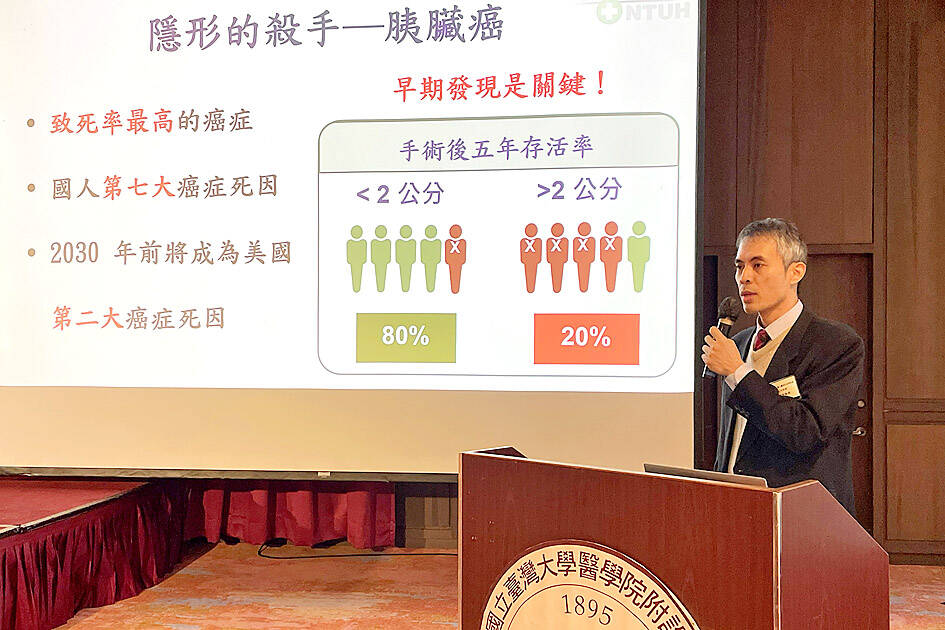National Taiwan University Hospital (NTUH) yesterday said its pancreatic cancer team has developed an artificial intelligence (AI)-assisted model for interpreting computed tomography (CT) scans, which can detect pancreatic cancer more accurately and at earlier stages.
Department of Internal Medicine professor Liao Wei-chih (廖偉智) said pancreatic cancer was the seventh-leading cause of cancer-related death in Taiwan in 2022, and it has been estimated that it could become the second-leading cause of cancer-related deaths in the US before 2030.
“Pancreatic cancer can progress rapidly, so early detection is the key to ensure a better prognosis,” he said.

Photo: Chiu Chih-jou, Taipei Times
The five-year survival rate after surgical resection is about 80 percent if the tumor detected is 2cm or smaller, but the survival rate drops to less than 20 percent if it is detected when the tumor grows bigger than 2cm, he said.
Liao said that people with early-stage pancreatic cancer usually have no symptoms, and about 40 percent of the 2cm or smaller tumors in the pancreas cannot be detected by a CT scan, so the disease is often detected at a late stage.
The medical team introduced an AI deep-learning algorithm jointly developed with National Taiwan University to help detect smaller pancreatic tumors and it can also accurately distinguish pancreatic cancer tissue from non-cancerous tissue, aiding radiologists and clinicians in recognizing suspicious lesions on CT scans, he said.
The AI algorithm was trained by using images from more than 3,000 cases at the hospital and tested with nationwide clinical data. The sensitivity rate for detecting pancreatic tumors 2cm or smaller was about 80 percent and image interpretation can be done in 1 minute, Liao said.
The team’s studies were published in Lancet Digital Health in 2020 and in Radiology last year, the hospital said, adding that the study on the AI-based method to provide early detection of pancreatic cancer also earned the Alexander R. Margulis Award last year for the best original scientific article published in Radiology.
The AI-assisted diagnosis system has obtained a Food and Drug Administration (FDA) medical device license, a “breakthrough device” designation by the US FDA, as well as several patents in Taiwan and the US, Liao said.
Meanwhile, Liao said endoscopic ultrasound is also an important tool that the hospital’s pancreatic cancer team use for clarifying whether there is actually a pancreatic tumor, its precise location and size, as it offers the highest resolution of the pancreas.
Endoscopic ultrasound-guided biopsies can assist in the diagnostic evaluation of benign or malignant tumors, he said.
Citing the case of a pancreatic cancer patient who suffered jaundice and biliary obstruction, he said a stent can be inserted into the bile duct through endoscopy surgery to relieve the symptoms, while a stent to keep the duodenum open could let the patient feel like eating again, and that the procedure is minimally invasive and the patient recovers quickly after the surgery.
NTUH said the treatment of pancreatic cancer is more complicated than other cancers, so the hospital’s pancreatic cancer team consists of healthcare professionals from more than eight departments to provide early detection and personalized precision medicine to help patients effectively fight the disease.

South Korean K-pop girl group Blackpink are to make Kaohsiung the first stop on their Asia tour when they perform at Kaohsiung National Stadium on Oct. 18 and 19, the event organizer said yesterday. The upcoming performances will also make Blackpink the first girl group ever to perform twice at the stadium. It will be the group’s third visit to Taiwan to stage a concert. The last time Blackpink held a concert in the city was in March 2023. Their first concert in Taiwan was on March 3, 2019, at NTSU Arena (Linkou Arena). The group’s 2022-2023 “Born Pink” tour set a

CPBL players, cheerleaders and officials pose at a news conference in Taipei yesterday announcing the upcoming All-Star Game. This year’s CPBL All-Star Weekend is to be held at the Taipei Dome on July 19 and 20.

The Taiwan High Court yesterday upheld a lower court’s decision that ruled in favor of former president Tsai Ing-wen (蔡英文) regarding the legitimacy of her doctoral degree. The issue surrounding Tsai’s academic credentials was raised by former political talk show host Dennis Peng (彭文正) in a Facebook post in June 2019, when Tsai was seeking re-election. Peng has repeatedly accused Tsai of never completing her doctoral dissertation to get a doctoral degree in law from the London School of Economics and Political Science (LSE) in 1984. He subsequently filed a declaratory action charging that

The Hualien Branch of the High Court today sentenced the main suspect in the 2021 fatal derailment of the Taroko Express to 12 years and six months in jail in the second trial of the suspect for his role in Taiwan’s deadliest train crash. Lee Yi-hsiang (李義祥), the driver of a crane truck that fell onto the tracks and which the the Taiwan Railways Administration's (TRA) train crashed into in an accident that killed 49 people and injured 200, was sentenced to seven years and 10 months in the first trial by the Hualien District Court in 2022. Hoa Van Hao, a